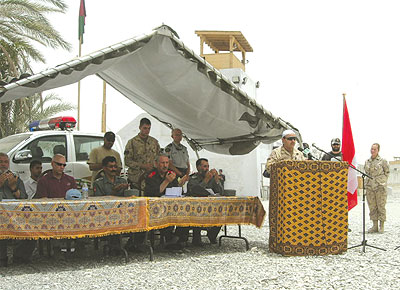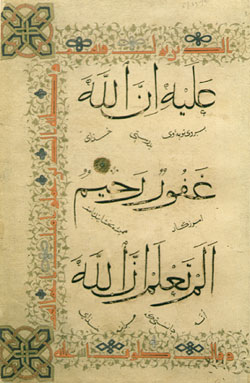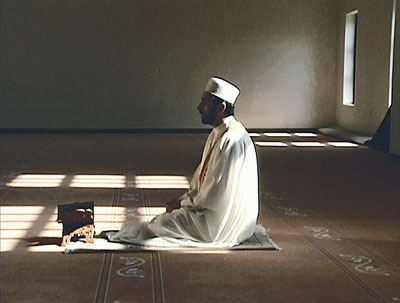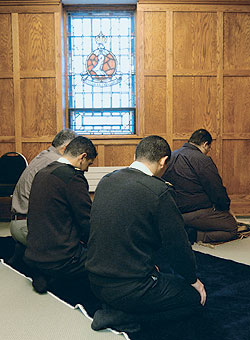 This information has been archived for reference or research purposes.
This information has been archived for reference or research purposes.
Archived Content
Information identified as archived on the Web is for reference, research or recordkeeping purposes. It has not been altered or updated after the date of archiving. Web pages that are archived on the Web are not subject to the Government of Canada Web Standards. As per the Communications Policy of the Government of Canada, you can request alternate formats on the "Contact Us" page.
Other Voices
The Treatment Of Prisoners Of War And Non-combatants In The Quran
For more information on accessing this file, please visit our help page.
Introduction
The mistreatment of prisoners of war and the suffering endured by non-combatants are seemingly unavoidable by-products of warfare, identifiable in all time periods and with a worldwide cross-cultural representation. Such acts committed during time periods and/or in cultures – with no laws, secular or religious, forbidding them – is lamentable enough. But when they take place in the context of a culture whose members are at least ostensibly guided in their actions by precepts they believe to have been revealed to them by God, such incidents take on an added poignancy. In the case of cultures whose sacred texts can be understood to forbid such practices, the victims of depredations may have been spared had the perpetrators kept in mind the teachings of their religion urging mercy upon those within their power. A prime example of this is Christianity, in which many of the sayings of Jesus can be understood as advocating a radical pacifism.1 On the other hand, in the case of a religion whose scriptures either showed indifference to the plight of captives and non-combatants or actually advocated the mistreatment of them, the fate of those caught within such situations could be perceived as having a disturbing inevitability. Recent events in Iraq, particularly the executions of captured westerners by the group led by the late Abu Musab al-Zarqawi,2 raise questions as to whether such treatment is condoned or encouraged in Islam. Accordingly, this article will examine passages in the Quran,3 the highest authority in all matters in Islam,4 that bear on the question of the treatment of prisoners of war and non-combatants in an attempt to arrive at an understanding of the message conveyed by the Quran on this subject. In so doing, it is hoped that it will provide members of the Canadian Forces (CF), other western armed forces, and other organizations engaged in Muslim countries with some understanding of the conceptual foundation underlying the activities of at least some members of the Muslim world.
As part of the process of determining the meaning of these quranic pronouncements, and as examples of how the early Muslim community would come to interpret them, the opinions of early quranic commentators, biographers of Muhammad, transmitters of hadith literature,5 and the classical Islamic schools of law,6 some opinions of which date back as early as the 8th Century,7 on the treatment of prisoners of war and non-combatants will be consulted. However, given the relative inaccessibility of this material compared to that of the Quran, coupled with its lesser authority in the hierarchy of written sources of Islamic tradition, it has been accessed only through secondary authors. Consequently, it was not thought proper to attempt a study of these opinions in their own right, but only insofar as they shed light on the meaning of the verses of the Quran to be examined.
Previous Literature
The bibliography on this subject is not large. The language barrier, more formidable for a variety of reasons than that posed by, say, a modern European language, no doubt accounts in large measure for this actuality. Moreover, the Arabs have been literate for a very long time,8 and classical Muslim scholars produced works that were enormous by any standard.9 Hence, investigators of any linguistic background have a large body of material with which to become familiar before tackling an Islamic subject authoritatively.10 Troy S. Thomas’s 1997 article Prisoners of War in Islam: a Legal Inquiry11 is useful as a brief overview, but his sources consist exclusively of modern Muslim authors writing in English. This fact, coupled with his declared purpose of vindicating Islam against Western scholarship,12 raises concerns about the author’s objectivity, although he relays many relevant hadiths and opinions of the jurists via his sources. More willing to confront the less-savoury aspects of the question are the sections entitled “Prisoners of War” and “Slaves” in Majid Khadduri’s 1955 War and Peace in the Law of Islam.13 Khadduri makes use of classical sources in the original, but his treatment is even briefer than that of Thomas. What appears to be needed is an approach to the question of prisoners of war and non-combatants similar to that taken by Sherman Jackson towards terrorism in his 2001 article, Domestic Terrorism in the Islamic Legal Tradition,14 which is lengthy, detailed, addresses multiple viewpoints, and shows knowledge of numerous multi-volume works of Islamic law, all available only in Arabic. Perhaps recent events in the Middle East will serve as a stimulus to such an undertaking.
One additional work worthy of mention is Reuven Firestone’s 1999 Jiha~d: The Origin of Holy War in Islam.15 While the treatment of prisoners of war and non-combatants is, in the author’s words, “irrelevant” to the purposes of his study,16 he nevertheless has useful comments to make on the subject at various points, for the work provides detailed interpretation of many verses of the Quran dealing with holy war that are also among those that discuss the treatment of captives. His primary sources are invariably the earliest Islamic authors, in Arabic, and he shows a remarkable ability to respect Islamic sensitivities, while in no way compromising on the findings of modern critical scholarship. As can be imagined, Firestone’s book has been of considerable use for the present study, which must now proceed.

DND photo DSCN1577
The Canadian Forces imam, Padre Suleyman Demiray, leading prayers in Afghanistan.
Quranic Passages Dealing with Captives: Milder Verses
There are several passages in the Quran that deal with the treatment of prisoners of war and/or non-combatants. Because the Quran provides almost no historical context for any of its passages,17 and has no discernible organizational principle,18 adjacent verses may have been grouped by subject matter that originally had no relation with one another.19 Consequently, the verses in question will be examined without consideration of the material preceding or following them. These passages can be divided into two groups. The first, comprising Quran 8:70, 9:6, 47:4 and 76:5, 8-10, consists of passages that comment on the treatment of prisoners of war. The second group, on the other hand, Quran 2:193, 9:5 and 9:29, discusses conditions that must be met before prisoners or non-combatants will be spared execution or enslavement.

Canadian Forces Muslim Chaplain’s Badge
Quran 47:4-5
When you meet the unbelievers in the battlefield strike off their heads and, when you have laid them low, bind your captives firmly. Then grant them their freedom or take a ransom from them, until War shall lay down her burdens.20
This is possibly the single most normative verse in the Quran concerning prisoners of war.21 It certainly provides the most extensive instructions of all the verses to be examined regarding their treatment: nothing other than release upon the payment of ransom, or gratuitous release, are envisaged here. After the cessation of hostilities, all prisoners are to be released gratuitously in any case.22 Despite the relative clarity of this injunction, by no means were the jurists unanimous in accepting it into their emerging bodies of law. The Maliki school forbade gratuitous release, while the Hanbalis were against release in any form.23 Nevertheless, granting freedom without ransom was held to atone for sins of many kinds, and was, in fact, carried out by Muhammad on many occasions, once to the tune of 6000 souls.24 He also frequently released prisoners upon payment of ransom, which could take the form of money, goods (including weapons), or even, on one occasion, a promise on the part of those to be released to perform charitable deeds.25 A special kind of release by ransom consists in the prisoner exchange, another common practice of Muhammad, which could also involve thousands of individuals.26 This practice was advocated by the caliph Umar, the second successor to Muhammad, as well as the Maliki27 and Hanafi schools of law.28 Finally, this verse was taken by some as justification for their opinion that prisoners of war were not to be killed.29
Quran 76:5, 8-10
[5] But the righteous... [8] give sustenance to the destitute, the orphan, and the captive, [9] saying: ‘We feed you for God’s sake only; we seek of you neither recompense nor thanks: [10] for we fear from our Lord a day of anguish and of woe.’
This passage is another that provides clear instruction regarding the treatment of prisoners of war, this time concerning the provision of food. In this there is to be no distinction between them and believing orphans and poor. In fact, the hadith literature records that, on one occasion, Muhammad ordered his soldiers to subsist on dates, while reserving bread for his prisoners.30 It was also a frequent practice of his to provide prisoners in need with clothing.31
Quran 8:71
Prophet, say to those you have taken captive: ‘If God finds goodness in your hearts, He will give you that which is better than what has been taken from you, and He will forgive you. God is forgiving and merciful.’
This verse is the first to be examined here that contains any indication that good treatment of prisoners of war is to be dependent on other requirements being met. However, it is unclear what significance, if any, may have been attached to the conditional phrase, ‘If God finds goodness in your hearts,’ in the schools of the classical jurists. Otherwise, the sentiment of the verse is positive, although no explicit behaviour is urged upon captors. The actions envisaged in the verse, in fact, appear to belong solely to God. In particular, the idea of receiving “better than what has been taken” is likely to have been achievable only in the afterlife. Nevertheless, it is difficult to see how any mistreatment of prisoners of war could be derived from this verse.
Quran 9:6
If an idolater seeks asylum with you, give him protection so that he may hear the Word of God, and then convey him to safety. For the idolaters are ignorant men.
An idolater, the primary enemy of the faith in the Quran,32 seeking asylum with a Muslim warrior would take the form of either a combatant giving himself up, or a non-combatant seeking protection. The distinction is somewhat moot, however, for the majority opinion among the quranic commentators would come to regard even non-combatants – such as women, children, the disabled, and monks33 – among the unbelievers as the enemy,34 and non-combatants thus became prisoners of war.35 In any case, the behaviour that is urged upon the captor is to provide “protection” and “safety.” The hadith literature expands considerably upon this, directing that, among other things, prisoners be protected from extremes of heat and cold, that they receive medical treatment, that they be allowed to complete wills for their property which will be communicated to their governments, and that near relations, i..e., in the case of a family taken into captivity, be kept together.36
There is, of course, a complicating factor here. The idolater is to be granted protection “so that he may hear the Word of God,” i.e., to have the Islamic faith preached to him, including, no doubt, the opportunity to convert. The phrase that follows, “and then convey him to safety,” is not, in its plain sense, conditional upon the prisoner accepting the call to Islam, but it may eventually have come to be understood by the commentators to mean that. In any event, the sentiment expressed here is but a small step away from the unambiguously conditional passages to be examined presently.
Hard-line or “Sword” Verses
Thus far it has been demonstrated that the Quran advocates that prisoners of war, as a bare minimum, be kept from harm, that they be fed, and that they be either released upon payment of a ransom, or let go without ransom. The overall tone of the injunctions in the passages discussed up to now is one of mildness. But as has been alluded to previously, there is another class of passages in the Quran, of which the next three verses to be examined are among the best examples, that urge upon believers the fighting of unbelievers until certain conditions are met. In this scheme, the status of non-combatant, or, in the case of a combatant, the act of giving oneself up, is not enough.
Quran 9:5
When the sacred months are over slay the idolaters wherever you find them. Arrest them, besiege them, and lie in ambush everywhere for them. If they repent and take to prayer and render the alms levy, allow them to go their way. God is forgiving and merciful.
This is the classic “sword verse” of the Quran, the origin of the (not strictly accurate) phrase “Islam or the sword.”37 It is understood as the warrant for total religious war against all unbelievers,38 including non-combatants.39 As such, it is considered to abrogate 124 less-aggressive verses of the Quran. Nevertheless, as can be derived from the verse, this state of affairs was only to continue until or unless the unbelievers accepted Islam. Taking to prayer and rendering the alms levy are recognizable enough as two of the five pillars of Islam. To “repent” was interpreted as another of the pillars, that of bearing witness to the unity of God and the prophethood of Muhammad.40 The question was examined by the commentators of why only three of the five pillars are represented here,41 but it is clear that the remaining two, that of fasting during Ramadan and making the hajj to Mecca,42 are not likely able to be carried out on the spot. Hence, the three requirements given here came to be regarded as a “rough-and-ready” indication of at least the outward observance of Islam. This viewpoint is supported by a hadith, in which Muhammad gives the same three requirements for the cessation of hostilities, with the exception that repentance is replaced by the bearing of witness.43
If the prisoner refused the call to Islam and the opportunity to join the Muslim community, various options were open to his captors, according to the jurists. Gratuitous release, release by ransom, and the related prisoner exchange, all derived ultimately from Quran 47:4-5, have already been discussed. However, Quran 9:5 and other “sword verses” provided justification for a further, grimmer option, that of execution.44 In this as well, there is a precedent set by Muhammad, who is said to have been responsible for the execution of four prisoners of war.45 While the four main schools of Islamic law may not all have agreed on the conditions of release, or whether release was even possible, they were unanimous on the permissibility of execution.46 This went so far, in the opinion of some, as to allow the act to be carried out immediately, i.e., before the prisoner had the chance to convert to Islam. However, less “hard line” opinion held that a prisoner could only be killed under certain conditions, such as high raisons d’état, the need to weaken the enemy,47 or if he were guilty of war crimes.48

CMJ collection
An illuminated page from the Quran.
The last option available to the captor is enslavement,49 and on this also, the jurists were unanimous.50 Justification for their viewpoint can be had in the practice of Muhammad, who is said to have enslaved thousands.51 While not directly derivable from Quran 9:5 or the remaining verses examined here, enslavement can be understood in some sense as the “other side of the coin” of execution, for there was frequently an age and gender divide between those who were to be killed, namely adult males, and those, women and children, who were to be enslaved. While this divide appears to be a holdover from pre-Islamic Arab practice, Muhammad, in fact, worked diligently to break the hold of old custom on the emerging Muslim community.52 Rather, it is a coincidental result of his admonitions gainst the killing of women and children:53 if they were not to be released, all that remained was their enslavement.54
Quran 9:29
Fight against such of those to whom the Scriptures were given as believe in neither God nor the Last Day, who do not forbid what God and His apostle have forbidden, and do not embrace the true Faith, until they pay tribute [i.e., payment] out of hand and are utterly subdued.
Whereas Quran 9:5 is directed against idolaters, this second “sword verse”55 applies to “those to whom the Scriptures were given,” i.e., Scriptuaries, or “People of the Book.” These were regarded by Muhammad as those to whom a prior revelation had been given, such as the Jews and the Christians.56 As the expanding Islamic polity encountered other peoples with sacred texts who did not want to give them up, and to whom the conquerors would presumably have found it impracticable to apply the sanction reserved for uncooperative idolaters, the category of Scriptuaries gradually expanded to include Zoroastrians, Hindus and Buddhists.57 In this scheme, the way for Scriptuaries to avoid execution or enslavement is to pay a poll tax (translated, somewhat idiomatically, as “tribute” by Dawood) and to agree to live as second-class citizens. The latter requirement is derived from the phrases “out of hand” and “utterly subdued.” While the precise meanings of these have never been clear, they came to be understood as requiring a form of ceremonial humility on the part of those paying the poll tax. Interestingly, Firestone speculates that the words “to whom the Scriptures were given” may have originally been missing from the verse, because both Jews and Christians believe in God and the Last Day. In that case, the verse would apply to idolaters,58 and two early commentators did interpret the verse to mean that the poll tax could be collected from idolaters.59 This would have been incompatible with the militant view towards idolaters that came to prevail.60
Quran 2:189
Fight against them until idolatry is no more and God’s religion reigns supreme. But if they desist, fight none except the evil-doers.
This verse, understood as a command to fight until Islam is the religion of hegemony, conveys, in its plain sense, the idea that idolaters merely have to give themselves up in order for the Muslim warrior to cease hostilities against them. The term “evil-doers” (translated, perhaps more accurately, as “oppressors” by Firestone) may have been understood, according to this scheme, merely as “aggressors.” This idea is incompatible with the militant stance against idolaters urged in Quran 9:5. Hence, the commentators understand “desist” in the sense of desisting from idolatry, i.e., converting to Islam, while taking “evil-doers” to mean those that refuse to convert.61 The verse then becomes the functional equivalent of Quran 9:5. Perhaps the classic statement of the interpretation placed on this verse by the commentators comes from the encyclopedic quranic commentary of al-Tabari: “even if the idolaters ceased fighting, it is still a requirement for the Muslims to fight them until they become Muslims.”62

Courtesy of Auteur Productions http://www.3faiths1god.com
Imam at prayer from the documentary, Three Faiths, One God: Judaism, Christianity, Islam.
Reconciling Contradictions: Classical and Modern Approaches
The contradiction between the first group of quranic passages examined in this article, urging mild treatment of prisoners of war, and the second group, extended moreover to include non-combatants, is striking. Muslim commentators have consequently, from the 8th Century, constructed a conceptual framework for arranging the various quranic pronouncements on warfare in an attempt to make sense of their dissimilar nature. This scheme supposes a gradual evolution of the Quran’s attitudes to war, corresponding to four historical phases in the life of Muhammad and the early Muslim community. In the first phase, non-confrontation was urged upon Muhammad and his followers, due to their relative weakness in hostile Mecca. In the second phase, after the hijra (migration) to Medina and relative safety, revelations were received allowing fighting against their Meccan enemies, but combat of a defensive nature only. With the requirement to raid Meccan caravans as a means of supporting themselves,63 the third phase witnessed the receipt of permission to initiate hostilities, as long as these were carried out according to pre-Islamic rules of conduct. In the final phase, with the Muslims moving into the ascendancy, the tone of the revelations changed to unlimited religious war.64 The quranic passages advocating mild treatment of prisoners would then, in this scheme, belong to the second or third phase, while Quran 2:193, 9:5 and 9:29 unquestionably belong to the fourth phase. Since they were the latest pronouncements on the subject to be received, the revelations of the fourth phase are to be taken as normative for all time, thereby solving the problem of which quranic pronouncements on the subject, all of which remain preserved in the canon, are to take precedence.65
An alternative explanation, less schematic than the one above, has been put forward by Reuven Firestone, in Chapter 4 of his book, Jiha~d. It has already been noted that the Quran provides virtually no information regarding the historical provenance of its pronouncements. Hence, it must be kept in mind that the scheme outlined above, as compelling as it may be, is no more than a speculative construct, dating from no closer than the 8th Century to the events of which it attempts to make sense. The various passages on war in the Quran, therefore, do not necessarily follow each other in an evolutionary progression through time, much less do they represent the view of the entire Muslim community on the subject at any given point on that continuum. Rather, the community, far from being the monolith the commentators often make it out to be, has harboured various views on warfare, including the treatment of prisoners of war and the involvement of non-combatants. The diverse utterances of Muhammad on these subjects as preserved in the Quran, therefore reflect his dealings with these different currents of opinion at various times. Rather than a gradual hardening of opinion as Muhammad’s life progressed, diverse viewpoints may have been held by members of the community right up until, and even beyond, Muhammad’s death and the end of the quranic period. The militant stance of the commentators, then, may only be a reflection of opinion and practice prevailing in their own times that was read back by them into the quranic period. Hence – and this is possibly where the real importance of Firestone’s contribution lies – no quranic passages on warfare take precedence over any others, and thus, modern-day reformers wishing to moderate the more militant aspects of resurgent Islam have as much quranic justification to back their views as do those who stand in opposition.
Conclusion
That the injunction of Quran 47:4 to “strike off their heads” at least appears to have had an eerie fulfillment in recent events can hardly be denied. Islamic military history certainly containssome spectacular precedents, particularly during the Crusades,66 when Muslim armies were fighting European invaders on their home soil, a situation that many in the Muslim world no doubt feel is being replayed currently in Iraq and Afghanistan. Nevertheless, that same history can also produce examples of a different sort. Consider this speech of the caliph Abu Bakr, delivered to the Muslim armies assembled for the invasion of Syria in 632:
In the land you will invade kill neither the aged, nor the little child, nor the woman. Do not force the stylite from his high perch and do not harass the solitary. They have devoted themselves to the service of God. Do not cut down any fruit-tree, neither damage any crop, neither maim any domestic animal, large or small. Wherever you are welcomed by a city or a people, make a solemn pact with them and give them reliable guarantees that they will be ruled according to their laws and according to the practices which obtained among them before our time. They will contract with you to pay in tribute whatever sum shall be settled between you, then they will be left alone in their confession and in their country. But as for those who do not welcome you, make war on them. Be careful to abide by all the just laws and commandments which have been given to you by God through our prophet, lest you excite the wrath of God.67

DND photo by Brad Lowe
RMC Muslim cadets at prayer.
Would that it had been so in all times and in all places.
![]()
Brian Bertosa is an independent scholar whose articles have appeared in the Journal of Military History and War and Society. His military experience includes three years as a reservist with the Royal Canadian Artillery.
Notes
- Some of the better-known examples include the injunction to turn the other cheek (Matthew 5:39, Luke 6:29), the warning that “all who take the sword will perish by the sword” (Matthew 26:52), and Jesus’s command to Peter to put down his sword in the scuffle prior to his arrest (Matthew 26:52, Luke 22:51, John 18:11; Peter is named only in John’s account). But even Jesus’s record in this regard is by no means perfect: there is his enigmatic statement, “I have come not to bring peace, but a sword” (Matthew 10:34), and his command to his disciples to buy swords on the night of his arrest (Luke 22:36, 38; quotations are from the New Revised Standard Version Bible [New York and Oxford: Oxford UP, 1989]).
- “Profile: Abu Musab al-Zarqawi,” BBC News, International Version, 10 November 2005 <http://news.bbc.co.uk/2/hi/middle_east/
3483089.stm>. - Unless given in a quotation or bibliographic reference, Arabic diacritical marks, along with the symbols ‘(ayn) and ‘(hamza), have been omitted, as they contribute little or nothing to an English-speaker’s pronunciation of Arabic names or terms.
- Theodor Nöldeke, “The Koran,” Encyclopaedia Britannica, 1891, reprinted in Ibn Warraq (ed.), The Origins of the Koran: Classic Essays on Islam’s Holy Book (Amherst, NY: Prometheus, 1998), pp. 62-63. As Nöldeke explains, this belief goes as far as to claim that the Quran is “immanent in [i.e., dwelling within] God, and consequently eternal and uncreated” (p. 63; italics in original).
- Hadiths are brief anecdotes about the words and deeds of Muhammad, constituting a voluminous literature (Reuven Firestone, Jiha~d: The Origin of Holy War in Islam (New York: Oxford UP, 1999), p. 94.
- These are the Hanafi, Hanbali, Maliki and Shafii schools, which had become the orthodox and authoritative schools in the Sunni tradition by the 11th Century (Sherman A. Jackson, “Domestic Terrorism in the Islamic Legal Tradition,” The Muslim World Vol. 91 (2001), p. 295.
- Reuven Firestone, “Conceptions of Holy War in Biblical and Qur’_nic Tradition,” Journal of Religious Ethics 24.1 (1996), pp 109-110.
- From the second millennium BC, first using imported scripts, then those of their own making (Robert G. Hoyland, Arabia and the Arabs: from the Bronze Age to the Coming of Islam (London and New York: Routledge, 2001), pp. 78-79.
- One example of many is the Annals of the Apostles and the Kings by the historian al-Tabari (ca. 838-923), translated as Franz Rosenthal (trans.), et al., The History of al-Tabari~, 39 vols. (Albany: SUNY Press, 1985-99).
- See Jackson, p. 306-307, Note 5, and p. 309, Note 52, for examples of the pitfalls non-specialists can run into when attempting to wade into the field of Islamic legal studies.
- The Muslim World 87.1, pp. 44-53.
- He states, among other things, that his article “challenges the Orientalist notion that Islam is spread by force” Thomas, p. 53.
- Baltimore: Johns Hopkins Press.
- See Note 6.
- See Note 5. This book was re-released in paperback in 2002, as with so many other works on Islam that might otherwise have languished were it not for the September 2001 terrorist attacks in the United States. This work largely supersedes, and in fact goes well beyond, the quranic portion of the author’s previous “Conceptions of Holy War in Biblical and Qur’_nic Tradition” (see Note 7).
- Firestone, Jiha~d, p. 99.
- Ibid., p. 70.
- Firestone, Conceptions, p. 108.
- Firestone, Jiha~d, pp. 47, 69.
- The remainder of 47:4, not given here, is irrelevant to the discussion. All quranic quotations are from N.J. Dawood (trans.), The Koran, 5th Edition (Harmondsworth: Penguin, 1997). While this version lacks (as do all too many Penguin editions of ancient works) exhaustive verse numbering, reducing its value for scholarly work, it more than makes up for this in terms of readability; in particular, it is one of the few available that is written in modern English, without the affected language of the King James Bible. Incidentally, notwithstanding the claims of many of its detractors, this version follows the traditional order of the suras (chapters), and has done so since the 1990 printing.
- Thomas, p. 47; see also Khadduri , p.127.
- Thomas, p. 51.
- Ibid., p.47. Khadduri (p. 127) points out that the caliph Abu Bakr, the successor to Muhammad, was against release for ransom, which implies that he thereby approved of gratuitous release.
- Thomas, p. 51.
- Ibid., pp. 50-51.
- Ibid., p. 51.
- Khadduri, pp. 127-128.
- Thomas, p. 49.
- Firestone, Jiha~d, p. 161, Note 84.
- Thomas, p. 52.
- Ibid., p. 50.
- Firestone, Jiha~d, p. 63. To all practical intents and purposes, the terms for “idolater” and “unbeliever” are used interchangeably in the Quran. Others against whom it was considered obligatory for the Muslims to fight are Scriptuaries, i.e., “People of the Book” (i.e.., Quran 2:109) until they pay the poll tax; “hypocrites” (i.e., Quran 9:73), those that appear outwardly to believe but actually oppose Muhammad and the community; and those Muslims who oppress other Muslims.
- Thomas, p. 48.
- Firestone, Jiha~d, pp. 56, 154, Note 68.
- Thomas, p. 48.
- Ibid., p. 50.
- Firestone, Jiha~d, pp. 62, 89.
- See above, Note 32 regarding the synonymity of idolaters and unbelievers. Regarding themselves as non-idolaters par excellence, Muslims considered all other faiths idolatrous, although with varying degrees of accuracy, particularly in the case of the Jews.
- Firestone, Jihha~d, pp. 63, 89.
- Ibid., p. 63.
- Ibid., p. 62.
- Arthur Goldschmidt, Jr., A Concise History of the Middle East, 5th Edition (Boulder, Colorado and Oxford: Westview Press, 1996), pp. 43-44.
- Firestone, Jihha~d, p. 63.
- Khadduri, p. 127, Thomas, p. 47.
- Thomas, p. 49.
- Ibid., p. 47.
- Khadduri, p. 127.
- Thomas, p. 49.
- Khadduri, p. 128, Thomas, p. 48.
- Thomas, p. 47.
- Khadduri, p. 131. He emancipated thousands as well, although this was often conditional upon their accepting Islam (Thomas, p. 48).
- Firestone, Jiha~d, pp. 87-88.
- Firestone, Jiha~d, p. 56, Khadduri, p. 129, Thomas, p. 48.
- The other possible fate of a prisoner, one of perpetual captivity, was not one of the jurists’ options, and may in fact have been considered synonymous with enslavement.
- Firestone, Conceptions, p. 111.
- Ibid., p. 112.
- Thomas, p. 47.
- Firestone, Jiha~d, p. 89; see also p. 64.
- Ibid., p. 161, Note 81.
- Ibid., p. 89.
- Ibid., p. 86.
- Al-Tabari, [Commentary], Book 9, p. 250, quoted. in Firestone, Jiha~d, p. 160, Note 74. I have omitted the full Arabic title of al-Tabari’s commentary. There is no possibility of confusion with his Annals in any case.
- Goldschmidt, pp. 33-34.
- Firestone, Conceptions, pp. 108-109, Jiha~d, Chapter 3.
- Firestone, Conceptions, pp. 110-111.
- The most egregious examples, among many, are probably the massacre of the pilgrims of Peter the Hermit in 1096 (Zoé Oldenbourg, The Crusades, Anne Carter (trans.) (New York: Pantheon, 1966), p. 85, and Saladin’s execution of all of his Templar and Hospitaller prisoners after the battle of Hattin in 1187 (Oldenbourg, pp.422-423).
- Chronicle of AD 1234, § 47, Text No. 13 in The Seventh Century in the West-Syrian Chronicles, Andrew Palmer and Sebastian Brock (trans.), Introduction by Robert Hoyland, Translated Texts for Historians 15 (Liverpool: Liverpool United Press, 1993).







